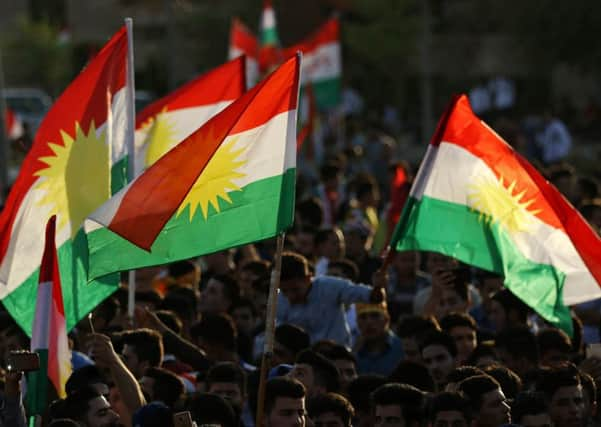Tensions rise in Iraq ahead of Kurdish independence vote


Iraq’s Kurds plan to hold the vote on 25 September in three governorates that make up their autonomous region as well as disputed areas like Kirkuk that are controlled by Kurdish forces but claimed by Baghdad.
Late last month, Kirkuk’s provincial council voted to take part in the referendum.
Advertisement
Hide AdAdvertisement
Hide AdIraq’s central government has rejected the polls as unconstitutional and illegal.
Politician Hussein al-Maliki said parliament voted to dismiss Kirkuk Governor Najmiddin Karim based on consultations with Prime Minister Haider al-Abadi.
Mohammed al-Karboli, another member of parliament, said Karim “threatens the country’s unity and civil peace in Kirkuk.”
All Kurdish members boycotted yesterday’s session, while 187 mainly Arab and Turkmen politicians voted in favour. The governor has the right to appeal the decision, al-Karboli added.
Shortly after the session, the Kirkuk governor rejected the parliament decision in a statement, describing it as “invalid” and insisting that he’ll stay in office.
“The parliament decision … doesn’t mean anything to Kirkuk and its governor who is still in office,” said the statement.
Oil-rich Kirkuk is home to a mix of Arabs, Kurds, Turkmen and Christians.
Kurdish forces took control of the province and other disputed areas in the summer of 2014, when the Islamic State group swept across northern and central Iraq and the Iraqi armed forces crumbled.
Advertisement
Hide AdAdvertisement
Hide AdIraq’s Kurdish region has enjoyed a high degree of autonomy since the US imposed a no-fly zone over northern Iraq after the 1990 Gulf War.
It has its own parliament and armed forces, flies its own flag, and has been a close US ally against IS and other militant groups.
But relations with Baghdad have grown strained in recent years over oil and the disputed areas.
The independence vote is already fuelling tensions. Baghdad and Iraq’s neighbours, Iran and Turkey, which worry it will encourage their own sizeable Kurdish populations, have all demanded it be called off.
The US has tried to persuade them to postpone the vote, fearing it will open a new chapter of instability even as US-backed forces try to recapture the last remaining IS-held pockets in Iraq. If they eventually do break away, it would be the most significant redrawing of borders in the Middle East since the creation of Israel in 1948.
It will split Iraq, tearing away a Switzerland-sized chunk, including key oil resources, and leaving the remainder with an Arab population split between a Shiite Muslim majority and Sunni minority. The Kurdish zone officially makes up about 10 percent of Iraq’s territory, with a population of about three million, around eight per cent of Iraq’s total 37 million. The leader of a powerful Shiite militia warned that his forces were ready to fight for the territories.